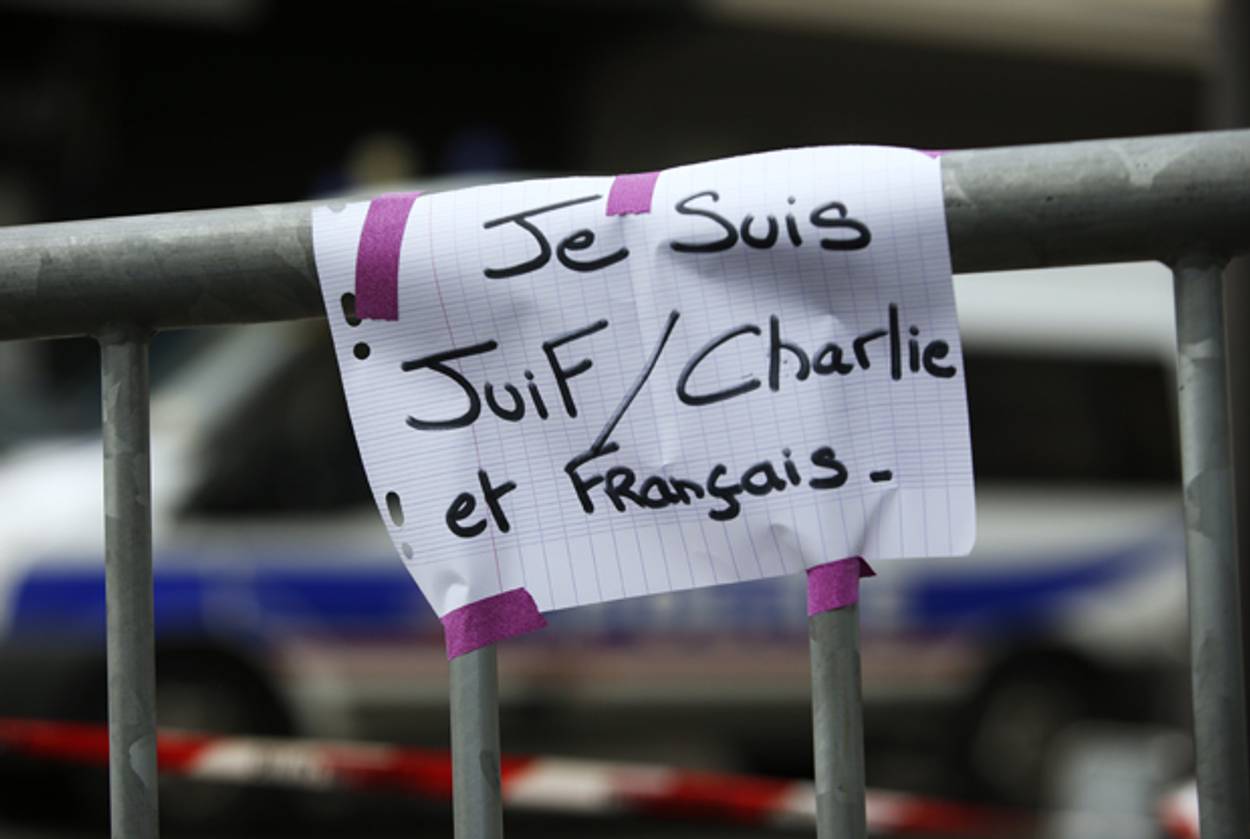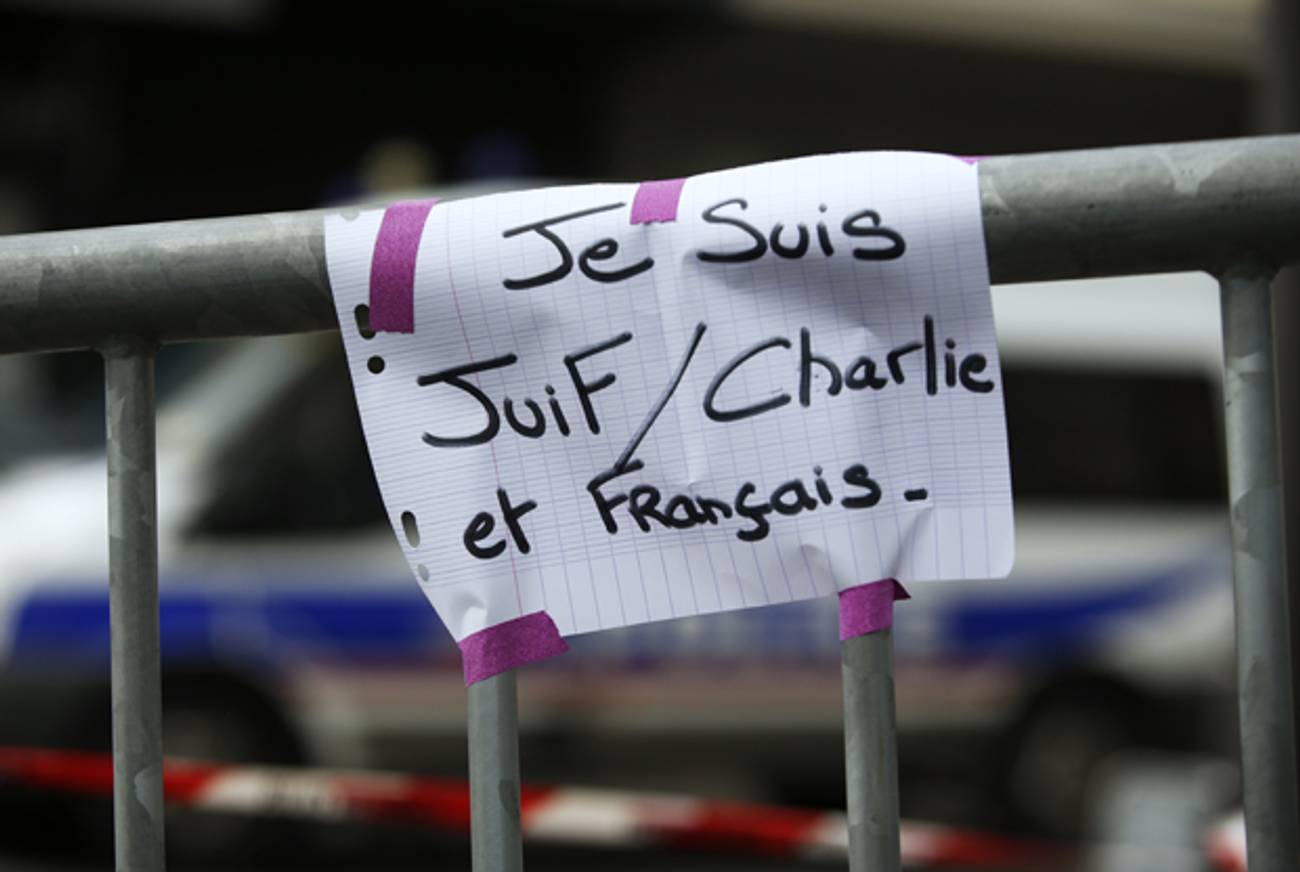For Jews in France, 2015 Isn’t the 1930s
The existence of the State of Israel is a reason to stay in Europe, not flee it




Articles and opinion pieces in major American newspapers have been predicting a mass exodus of French Jews to Israel following the terror attacks in Paris. This is unlikely, at least as a consequence of this month’s events. Though tragic, the dual attacks unfortunately don’t stand out against the backdrop of recent French Jewish history. They shocked the wider French and international communities primarily because of the attack on press freedom represented by the Charlie Hebdo massacre. The Jewish part of the story, though—the deadly siege of a kosher supermarket—is a sadly unexceptional episode, part of a trend that includes the 2012 attack on a Jewish school in Toulouse, in which three children and a teacher were killed, a French gunman’s fatal attack on the Jewish Museum in Brussels, a violent mob’s standoff with congregants at a major Paris synagogue last summer, the torture and execution in Paris of Ilan Halimi in 2006, and hundreds of other violent incidents directed at French Jewry. The personal security of French Jews has been meaningfully threatened for more than a decade.
Last year, nearly 7,000 Jews left France, mostly for Israel. If sustained over time, this number constitutes a significant trend, but hardly a rush for the exits—after all, 7,000 people represents just over one percent of French Jewry. While the situation for French Jews today is certainly difficult, and perhaps untenable for much longer, it is not, as some writers have suggested, analogous with 1930s Europe. The key difference is that violence against Jews today is perpetrated almost exclusively by a marginalized fringe of the French population: radical Islamists. This group is, of course, dangerous, and may be significant in number, but does not represent the French majority, nor the policies of the French government.
Unlike the 1930s, there is no legal door closing, blocking exit for the Jews of France. More importantly, Jews leaving Europe today have a ready and open refuge in Israel. These two key differences are precisely what allows France’s Jews to stay and work toward improving the current state of affairs. There is no deadline to force the difficult decision to leave France. Community life, education, and careers are not easily reconstructed, and most French Jews will likely exhaust all reasonable efforts to address the challenge of anti-Semitism before giving these up.
And they should. After all, French Jews are not simply guests in France. They are at home. France’s Jewish community has been an essential component of French identity for centuries. In light of the current atmosphere, French Prime Minister Manuel Valls is both prescient and politically-brave in his declaration that France is not France without the Jews. Indeed, Europe is not Europe without the Jews. Relativity, psychoanalysis, socialism, modern anthropology, color photography, hypnosis, thermodynamics, Planck’s Constant, drinking-water chlorination, cures for polio, smallpox, measles, hepatitis B, tetanus, diphtheria, bacterial meningitis; blood transfusions, Streptomycin antibiotic, mammography, the sewing machine, the ball point pen, the laser, video recording, flash drives, Internet search, and countless other foundational innovations of modern Western civilization sprang from European Jewry. Western culture and history would be arguably unrecognizable without the influences of Mendelsohn, Freud, Einstein, Pissarro, Heine, Mahler, Kafka, Disraeli, Proust, Marx, Offenbach, Kandinsky, Levi-Strauss, Rothko, Berlin, Modigliani, and Gershwin, a small fraction of an almost inexhaustible list.
France’s is the largest remaining European Jewish community, an integral part of the legacy of Western civilization, and of the narrower legacy of French identity. Rothschild, Citroen, Dassault, Bleustein-Blanchet, Carasso, Camondo, and Hirsch are tent poles of French economic history. French popular culture cannot be unlinked from Bernhardt, Gainsbourg, Marceau, Bruel, Macias, Levy, and many, many others. Jews have occupied critical posts in French civil service, and have included prime ministers, foreign, finance, interior, justice, health and culture minsters.
Some who have rushed to proclaim an end to Jewish life in France are too quick to dismiss this rich legacy. Valls’ passionate speech in French Parliament was a national call to action. France has good reason to fight for its Jews. And Europe’s largest remaining Jewish community has good reason to fight for its centuries-old home. Israel’s role remains vital to world Jewry. If this was not always understood, it should be crystal clear in light of the European Jewish experience in the past decade. The bonds between Israeli and European Jewry are appropriately stronger than they have been in many years.
As chairman of KIEDF, an organization that has helped to create or sustain more than 50,000 jobs in Israel through almost $350 million issued in small business loans, supporting immigration is important to me. A large percentage of our loans have gone to businesses owned by recent immigrants to Israel, including French immigrants. KIEDF and other institutions will continue to serve the critical functions of economic, social, and cultural integration in Israel. They are the mechanisms that make Israel a viable refuge. But an active, thriving European Jewish community is a critical interest, both to Jews and to anyone who cares about Europe’s future. Perhaps ironically, rather than draining Europe of its Jews, Israel will play a key role in maintaining a meaningful Jewish presence in Europe. This will require a serious effort among Jewish communities, and from the wider European community, to reverse the dangerous trend that Europe has allowed to take root.
Tal Keinan is chairman of Koret Israel Economic Development Funds (KIEDF), Israel’s largest microfinance and small business-lending program
Tal Keinan is chairman of Koret Israel Economic Development Funds (KIEDF), Israel’s largest microfinance and small business-lending program